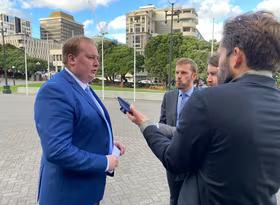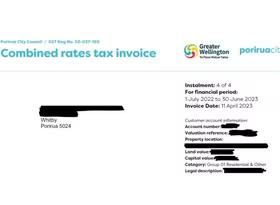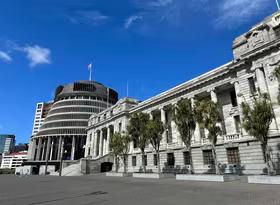This opinion piece was first published on Stuff on 22 April 2024.
The government’s plans to fully deliver its promised tax cuts at next month’s budget must be in doubt, as the economy falters and the fiscal position continues to get squeezed. Compared to the government’s 2023 Budget, the deficit is tracking to be $1.8b larger than forecast – primarily thanks to an 11% fall in corporate tax revenue since late 2022, which is running about $3.1b below last May’s expectations.
So far, the fall in corporate tax revenue is still mild compared to the one in the wake of the Global Financial Crisis, when there was a 38% fall in corporate tax between mid-2008 and mid-2010 that took a further six years to recover. But testing times remain in store for the economy throughout the next 12 months, and Treasury’s forecast pick-up in corporate tax in the June 2025 year looks optimistically premature.
Aren’t tax cuts stupid when we’re already in deficit?
Treasury’s most recent forecasts, from December, predicted a $9.3b budget deficit for the government in 2023/24, with the accounts not returning to surplus until 2027. The continued deterioration in economic outcomes suggests both a larger deficit this year and a slower return to surplus, as signalled by the government in the Budget Policy Statement.
Treasury also forecast that the government would be spending more than it earns, by about $6.1b in 2024/25. Given the forecast assumptions underpinning the fiscal numbers already seem overly hopeful, forgoing another couple of billion dollars in revenue and increasing the deficit further might seem irresponsible. That conclusion becomes even more valid when one considers that National’s broader pre-election fiscal programme has had to change through the coalition negotiation process, with some estimates suggesting an additional shortfall in net revenue of about $1.5b.
Of course, it’s not necessarily an “either-or” decision when it comes to the proposed income tax cuts or reducing the budget deficit. The government has a range of other options to meet its fiscal targets: implementing other new taxes such as a capital gains tax, increasing existing taxes such as GST, making further incremental spending cuts, or disestablishing other work programmes.
But National seems to have backed itself into a corner by campaigning so heavily on tax cuts at a time when the government books were already not in a good state – and making larger fiscal commitments already that leave less room to manoeuvre. Although there’s no strict rule stating that taxes can’t be cut while you’re running a deficit, National’s approach suggests the prioritisation of an ideological campaign promise over a more prudent fiscal stance. Perhaps National views the alternative to tax cuts as taking less of a knife to government spending, and that they’re going to run the same size deficit either way. If that’s the case, it becomes a question for voters of whether they want the government to spend the money (with all the implications for redistribution and the provision of services that go alongside that approach), or whether they’d rather have the money themselves.
No, tax cuts won’t just keep inflation higher for longer
The view that tax cuts will lead to more spending by households, more demand in the economy, and therefore more persistent inflation, is horribly simplistic – and in this case, unlikely. What the Coalition government is considering is not at all comparable with Liz Truss’ short-lived premiership in the UK. In the first instance, if tax cuts are funded by an equal reduction in government spending, then the amount of money flowing through the economy is the same – it’s just a different agent doing the spending. As I’ve argued above, I don’t think it’s an appropriate comparison to say the government would simply reduce the deficit by the same amount if it didn’t implement tax cuts – we would be more likely to see a slower reduction in government spending instead.
However, the argument about inflation is even more nuanced than that. Firstly, the shift in spending from government to households is only equal if households spend all the additional money they receive through the tax cuts. In the current difficult economic environment, it is likely that some households will either save some of the additional cash – particularly given faltering job security – or use the money to meet their mortgage repayments or reduce debt. Funnily enough, that outcome is exactly what monetary policy from the Reserve Bank is designed to achieve. More saving or debt reduction actually leads to a reduction in overall demand across the economy, and therefore should moderate inflationary pressures.
Secondly, a concept called Ricardian Equivalence states that households will only spend the extra money from a tax cut if they think it is semi-permanent or sustainable. Otherwise, households see the additional cash as a short-term government “bribe” that will need to be repaid via higher taxes in the future, so they save the money in the belief that budgets will be tighter in coming years. Given the debate about the government’s current fiscal position, this argument for consumers not to spend all the money also has validity.
In summary, then, it seems likely that tax cuts in the current environment will be less inflationary for the economy than if the money was kept by the government and there was less pressure to cut public sector spending.
Are they really tax cuts, or fixing fiscal drag?
The “tax cut” phrasing is all a bit peculiar anyway. Because consumer prices have risen 11% over the last two years, the adjustments to the tax brackets that National campaigned on would only rewind the thresholds back to the equivalent purchasing power of the dollar at the start of 2022. If tax brackets were to mirror the rest of National’s policy agenda, stepping back to 2017 and reversing seemingly all Labour’s initiatives of the last six years, the reduction in tax revenue would be more than double the cost of National’s election promise. If you take it a step further and adjust for the full effects of 40% inflation since the current tax thresholds were introduced in 2010, the reduction in tax revenue triples from the current proposal.
One might argue that the tax brackets set in 2010 were unsustainably low – they certainly look that way given examples such as the underfunding of the health sector, or mounting infrastructure deficit, that have become increasingly apparent in subsequent years. But if we’re going to have a grown-up debate about the appropriate level of taxation in this country, we can’t ignore the fact that the government’s revenue has grown substantially over the last decade, helped by particularly strong inflation over the last few years. That increase in revenue has contributed to a lack of focus in government spending as departments’ briefs have widened substantially, and a lack of discipline as the easiest policy approach has simply been to throw more money at perceived problems.
Just a vote winner, after all?
Are households due some relief from the surge in living costs over the last three years? Absolutely. But it’s difficult to argue that now is a good time to be implementing tax adjustments, given government deficits and areas of the economy that need major capital investment. Perhaps the only positives to take from National’s position are that more discipline is being brought into government spending, and that handing more money back to households seems unlikely to make it harder for the Reserve Bank to bring inflation back under control.
Although not what economists might decide is best, politically the government has campaigned heavily on delivering tax relief. Perhaps then, given fiscal conditions, it’d be an agreeable compromise to either stagger tax relief, or delay relief until the end of the current government term when fiscal settings are forecast to be better.
Like the politicians’ pay freeze of the last seven years, the current dilemma highlights the need for settings to be adjusted gradually with inflation – otherwise, the longer you leave it, the more out of kilter things get. Indexing tax thresholds to inflation would remove a lot of the murk out of the tax system, meaning that any government that wanted to raise or lower taxes would need to make a strong case for why spending needed to increase or could be scaled back.









